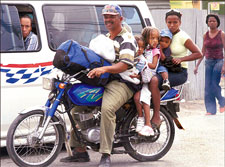Over the years I have had a variety of birthday parties, though turning a year older has lost its lustre since pass-the-parcel was relegated from the celebrations. This year’s celebration was interesting, unplanned and very bizarre.
My original plan was to head down to
Of course, I couldn’t resist introducing myself to the man himself, who was busy wondering why a Gringo had just walked into his estate and interrupted a very important task. He was so shocked to hear that we shared a birthday that he couldn’t help inviting this complete stranger to his party. And that is how I ended up at the party of someone who I had only met before in the society pages of
In some ways, it was a distressingly low scale affair, just twenty or so rich businessmen and other friends from the capital, plus a couple of local employees. Whilst the pig was roasting, I got force fed whisky. Disappointingly it was Johnnie Walker, and for a man who is known for his ownership of a large beverage company, amongst other things, there was none of the family product. And of course, it was a long afternoon, so I had to keep drinking. It was not difficult, given the presence of free alcohol – you can take the Scotsman out of
The man himself was thoroughly charming, and we all had a good time drinking, chatting and eating roast pork after four hours cooking time. After the food it was time for a traditional activity here in the mountains, called “Teaching the Gringo to Dance Whilst Trying Not to Laugh, or Wince When He Steps on My Toes. Again.”.
Very patient, and all excellent dancers. Quote of the evening must be “keep your shoulders still and move the hips. Imagine that you are making love to a beautiful woman.”. My bad dancing was one of two faux pas in the evening; chatting to a major industrialist about his business I commented on how much I enjoyed a particular product of his, only to be met with a stony silence. I then realised that I had just mentioned not his product, but the major rival brand.
As I lived only a few minutes walk, they simply would not let me leave as people slowly departed for home. I ended up in a hardcore group of 5, drinking and singing along the explicit lyrics of various Dominican hit songs. Dominican country music shares the same universal themes as traditional rural music in other areas – drink and women, but combining these with Carry On lyrics. I seem to remember one with a chorus that went “Juana, peel my Banana”. We were all rather drunk, though I have to say that these fellows can’t hold it well, as I have vague memories of someone comically falling into a pot plant. A great time with the sort of people who I would have imagined that I would detest, but who turn out to be kind and generous.
It goes without saying that I am currently engaged in detailed research into local hangover cures.

